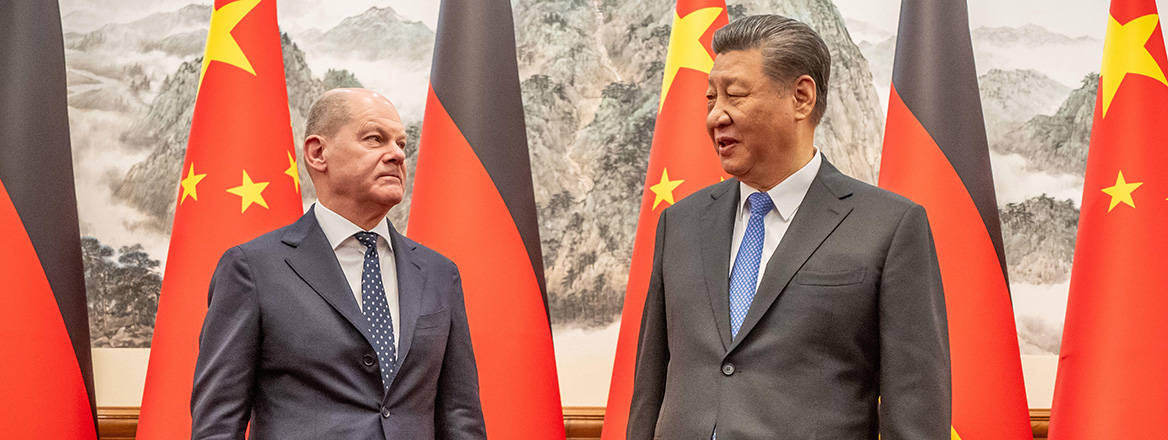How Entanglement with China Erodes Germany's Strategic Autonomy
Strategic blindness in Germany’s approach to China has led to mounting costs in terms of national sovereignty, economic independence and civil liberties. Disentangling from Beijing will not be easy, but the benefits will outweigh any short-term difficulties.
German Chancellor Scholz's recent visit to China has been widely met with derision. Some analysts have called it a 'disaster', criticised Scholz for ignoring US calls to de-risk the country's relationship with Beijing, or lambasted him for his 'strategic unseriousness'. In my forthcoming book I highlight shortcomings in German strategic thinking which have led to such outcomes. What has happened to Germany over the past 30 years should serve as a warning about the steady erosion of state sovereignty due to a liberal democracy's growing entanglement with an autocratic superpower like China.
Hybrid Interference
China is often described as a partner, competitor and systemic rival. This trifecta has not gone unchallenged, however. During a public talk at the German Council on Foreign Relations in June 2022, Scholz's foreign policy advisor Jens Plötner argued against overemphasising systemic rivalry, as it supposedly would make international cooperation with China more difficult. On the contrary, I argue in my book that the Chinese Communist Party (CCP) is a threat to freedom, prosperity and security worldwide. This is not to say that the problem lies with the Chinese people, who have no meaningful influence over the way China is governed. Under General Secretary Xi Jinping a hard authoritarian turn has occurred. Xi has repeatedly instructed officials to struggle against the party's opponents, both at home and abroad.
In 2013, Xi also said that ‘(to) dismiss the history of the Soviet Union and the Soviet Communist Party, to dismiss Lenin and Stalin, and to dismiss everything else is to engage in historic nihilism, and it confuses our thoughts and undermines the Party’s organisations on all levels’. The concept of 'perpetual struggle', a key feature of both Maoism and Stalinism, also informs Xi's thinking. Under Xi the CCP's friend-enemy mentality, framing and structuring China´s foreign policy, has come to the fore. It is often ignored that Chinese foreign policy is informed by the interests of the party, not the state as such. The party has traditionally followed a united front approach, whereby the CCP is seen as the 'avant-garde'. Its opponents are seen as 'enemies' or so-called 'waverers'. Such an anti-liberal worldview informs the work of the United Front system, a well-funded bureaucracy which is tasked with fighting the party's enemies and co-opting waverers.
In the German political discourse, foreign interference is sometimes referred to as hybrid warfare, a term which in my view needlessly militarises the issue. In my book I distinguish between kinetic and non-kinetic threats. As an example of the latter, hybrid interference is still a formidable challenge, since even cumulatively such illegal interference has not sufficiently raised threat perceptions in Berlin. This is part of the learning pathology of German China policy. I explain that the CCP’s hybrid interference in Germany and other liberal democracies uses three categories of means. Specifically, I differentiate between (1) clandestine diplomacy conducted through the CCP’s united front system; (2) power trading, predatory technology transfers and geoeconomic coercion; and (3) attempts at global speech control and disinformation campaigns.
It should be noted that China is not alone in trying to manipulate Germany's strategic interests. As the strongest actor in an informal axis of autocracies (which has been dubbed CRINK and also includes Russia, Iran and North Korea), CCP-led China seeks to undermine Western-style liberal democracies worldwide. This also explains why the CCP seeks to drive a wedge between Germany/Europe and the US. Such a wedge strategy is also aimed at undermining a united European approach to China.
Mounting Costs of Strategic Blindness
In my book I point out that in addition to the three dependencies on raw materials, intermediate products required for industry production and revenues generated in the Chinese market, a fourth dependency exists: psychological dependency. This refers to a strategic blindness, where German stakeholders feel in control when in fact the CCP already manipulates their behaviour. Encroachments on Germany's national sovereignty, economic independence and civil liberties become more visible once we adopt a longitudinal perspective. A constant fear of retribution from Beijing coupled with political inertia in Berlin has already led to real-world damage. The following examples illustrate the mounting cost of Germany's entanglement with autocratic China.
Swift Demise of Germany's Solar Industry
During EU negotiations with China in 2012, the Merkel administration downplayed unfair trade practices in China's solar panel industry. This was done to shield German automakers from possible reprisals by the CCP in response to high protective tariffs. Allowing cheaper Chinese panels to flood the market crippled Germany's solar industry, which was once a global leader.
China's Rapid Takeover of German Industry 4.0 Assets
German efforts to form a consortium for the purpose of countering Midea's bid for Kuka Roboter GmbH in 2016 failed. Daimler reportedly resisted joining a European consortium because it feared this might anger Beijing. In part due to this decision, Germany lost one of its pioneers in automation technology, often described as one of its ‘crown jewels’.
Critical Infrastructure at Risk
In 2019 Chinese Ambassador Wu Ken warned that German automakers in China could face repercussions should Huawei be excluded from Germany's 5G network. Neither Merkel's government nor the Scholz administration have dared to shut out the Chinese IT provider from Germany’s critical infrastructure. Both the digital privacy of consumers and national security are now at risk.
Corporate Overexposure
I argue that Berlin is already being held hostage to the fortunes of Volkswagen, BMW and Mercedes-Benz in the Chinese market. Threats of coercion now hang like a dark shadow over Germany–China relations. Worryingly, Germany has failed to protect its interests not only in industry and technology but also in other sectors like development aid, security and academia.
Squandered German Leverage in China
As early as 2006, an independent study by the German Development Institute warned the Federal Ministry for Economic Cooperation and Development that German development agencies were being instrumentalised by the Chinese party-state to further its own interests. A restrictive Overseas NGO Law in 2017 exacerbated this problem of co-optation, effectively neutralising German political foundations as critical aid actors.
Jeopardising Vital Trade Routes in the South China Sea
In 2007 the US issued a request to better regulate German dual-use exports which would help with China's military modernisation. Regardless, German mechanical engineering company MTU Friedrichshafen supplied diesel engines for Chinese submarines and engines for People’s Liberation Army Navy (PLAN) surface vessels. It wasn't until 2017, a decade later, that the Merkel administration mandated export approval for all submarine engines. However, this long delay allowed the PLAN to make substantial progress in its modernisation efforts.
Insufficient Pushback Against the CCP's Transnational Repression
In reaction to coordinated sanctions imposed by the EU, the UK, the US and Canada in spring 2021 due to human rights violations in the Xinjiang Uyghur Autonomous Region, the CCP targeted parliamentarians, lawyers and academics with counter-sanctions as a form of retaliation. It is important to note that Merkel's silence on such infringement of academic freedoms, combined with the reluctance of numerous senior German China scholars to publicly criticise the CCP's globalising censorship regime, undermined collective attempts to lift the counter-sanctions.
Even partial decoupling in the realms of industry, technology, development aid and academia will be met by fierce opposition from defenders of the status quo in both countries
Berlin's inability to counter Beijing's hybrid interference is also due to an unwillingness to question the ideological assumptions of German foreign (trade) policy and diplomacy. For decades, senior German politicians and industrialists have monopolised China policy. 'Change through trade' was their prophecy and promise. The rise of the informal CRINK axis of autocracies has put the final nail in the coffin of this foreign policy paradigm.
Towards Strategic Clarity
Germany now finds itself in a strategic grey zone with respect to China. Full decoupling is widely seen as undesirable and not considered a realistic option in the German and European debate. Yet alternative solutions such as de-risking and diversification have done little to restore Germany's strategic autonomy. In order to protect national sovereignty, increase industrial competitiveness and strengthen democratic resilience, some form of disentanglement is in order – but this will not be easy. Even partial decoupling in the realms of industry, technology, development aid and academia will be met by fierce opposition from defenders of the status quo in both countries. Despite the difficulties of disentanglement, I would argue that the long-term benefits of safeguarding sovereignty and critical infrastructure far outweigh any short-term costs.
Some critics will call my new book alarmist. I hope that it will serve as a wake-up call. There is an urgent need for liberal democracies to address the growing threat of the informal CRINK axis. Continued apathy and inaction in Berlin will only serve to jeopardise transatlantic relations, undermine European unity and weaken NATO's collective deterrence. The stakes are high; the time to act is now.
The author's latest book, Germany and China: How Entanglement Undermines Freedom, Prosperity and Security (Bloomsbury, 2024), is slated for publication on 30 May.
The views expressed in this Commentary are the author’s, and do not represent those of RUSI or any other institution.
Have an idea for a Commentary you’d like to write for us? Send a short pitch to commentaries@rusi.org and we’ll get back to you if it fits into our research interests. Full guidelines for contributors can be found here.
WRITTEN BY
Andreas Fulda
- Jim McLeanMedia Relations Manager+44 (0)7917 373 069JimMc@rusi.org


